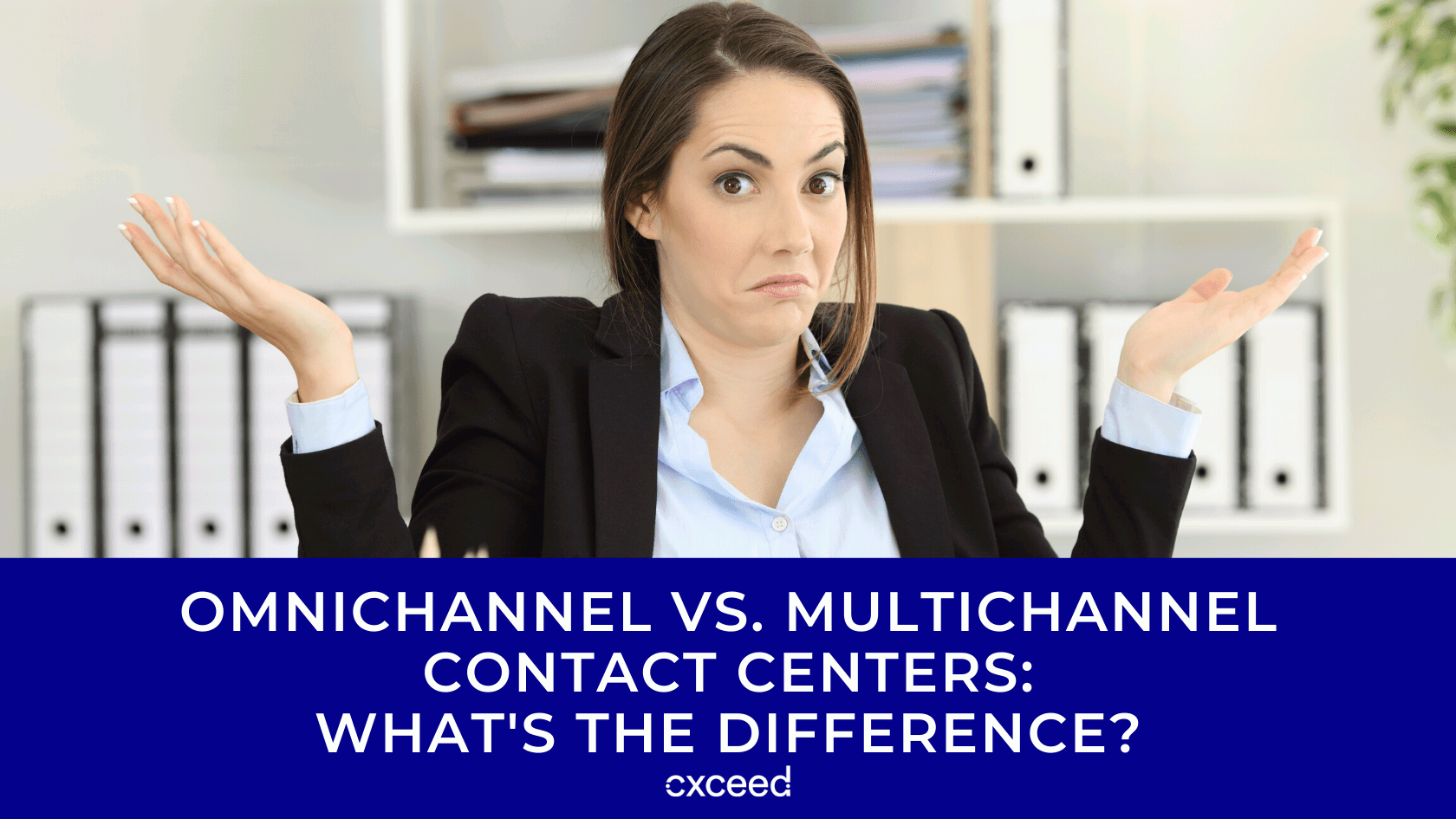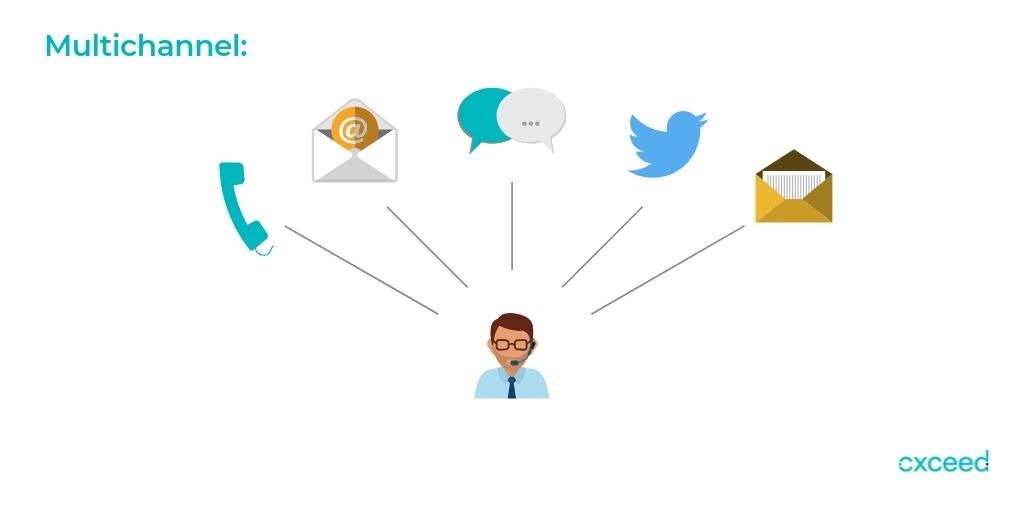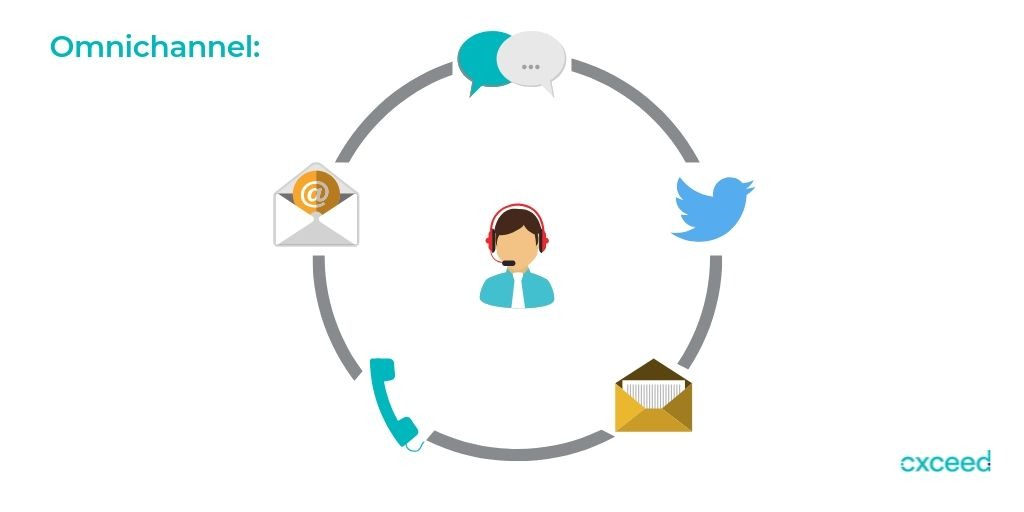What Is an Omni Channel Contact Centre

Omnichannel vs. Multichannel Contact Centers: What's The Difference?
If ever there were two buzz words that are always mixed up with each other, it'd be Omnichannel and Multichannel.
Some people think that Omnichannel is just a fancy way of saying Multichannel and that they mean the same thing.
That's wrong, and to make myself look cultured, I'm going to tell you what Omni means! It's Latin for "All" (No, I didn't just Google that before writing this blog... and no, you definitely don't need to check my Internet history).
Omni and Multi both use multiple channels of communication, but what's the difference between the two, and why does it matter? Is one better than the other? You're going to find out in this blog!
What is a Multichannel Contact Center?

A multichannel contact centre allows agents and customers to interact with each other through various communication channels.
Here's a spoiler: unlike omnichannel, each channel of communication operates in isolation from one another.
These forms of communication can vary from phone calls, email, letters, SMS's, live chats, video chats... You name it, and it's probably there!
Multichannel was the predecessor to omnichannel communications but is still used by many centres.
If you want to find out more about multichannel customer service, why not have a read of our dedicated blog before you go further?
What is an Omnichannel Contact Center?

As with the previous channel, omnichannel uses multiple methods of communication - The difference being a seamless experience is delivered across all means of communication. Every piece of information given by the customer is stored in one database and can be accessed by any agent on any platform.
Connecting all the dots makes it easier for everyone. Agents can easily access customer information and look at past interactions. This gives them a better view of the situation, increasing the chance of having a First Contact Resolution (FCR).
As with multichannel, these communication platforms can vary from phone calls to social media. In omnichannel communications, all the information is shared across the platforms, whereas it's not with multichannel.
How is it Done?
Every time an employee interacts with a client, they gather valuable data that needs to be stored, examined, and shared.
Businesses need a system that allows fast and errorless access to this data for employees, as well as a system to store and measure the data to help with further improvement strategies.
To successfully implement their omnichannel strategy, businesses need to ensure two things:
1. Data is easily visible to those who need to see it.
2. Staff have quick and easy access to the data.
Why Isn't Every Contact Center Omnichannel?
Since omnichannel is arguably a better version of multichannel, you'd think everyone would be doing it? That's not the case.
Well, it's a bit more complicated than it appears on first glance.
Overhauling The Current System
Depending on systems and software used, an overhaul in the technology may be required to be able to interlink everything.
You need to make sure you make the right investments, and that it's actually worth the money.
Then you've got to install the whole thing! And we all know that it's never as simple as it looks!
Many organizations are put off with the following problems that come from switching to an omnichannel approach.
Financial Cost
You don't get anything for free in this world (except the free version of Cxceed), and being able to connect these dots can be expensive. If a business is unable to demonstrate a return on their investment, then it is simply not a viable option for them.
Of course, by not investing, you would only limit the customer experience you're providing, but that's the price you pay for not spending the cash.
Time
Training agents, ensuring they know and understand new procedures and making everyone is on the same page, takes time.
For some busy centres, this is definitely not a viable option.
When profit margins can be so narrow, many don't want to risk taking a short-term hit, even if it's good for the long-term.
Time is money, and money is, well, money!
Switching to omnichannel takes a lot of planning from a company, as well as full commitment to the cause.
Which is Better: Omnichannel or Multichannel?
There are two sides to this question: the customer experience side and the company's side.
The Customer
For the customer, an omnichannel method of communication would be the best.
It allows for seamless integration of the information and data. So every time a customer interacts with the company, no matter the platform, every agent will be able to access past problems, details, and requests.
In theory, this should allow more issues to be resolved quickly and on the first contact - more efficient service will always keep the customer happy.
I don't know about you, but there is nothing more annoying than having to repeat and confirm many details every time you talk to another agent!
The Company
This isn't as straight forward.
On the one hand, investing in an omnichannel system will improve efficiency for agents, as discussed above. We know that better customer experience is always beneficial for an organisation and its reputation.
An Aberdeen Group study found that the strongest omnichannel companies retained an average of 89% of their customers. This is compared to a mere 33% for businesses with a weak omnichannel strategy.
It's not just about investing in omnichannel though; it's about planning for it too.
But will an omnichannel service define the customer experience provided? Well, I believe it depends on the size of the business. The bigger the company, the greater the need for omnichannel services. Not only because of the need for organised data increases, but also due to the associated costs.
For smaller companies, these costs (both financial and time) can be the difference between success and being another failure.
Smaller companies may be able to get away with it due to the tight-knit nature of operations.
The reality is that you have to plan for the future. If these small companies wish to provide excellent customer experiences, they should prepare for an omnichannel strategy. But the longer you leave it, the harder it can be to change and adapt.
The Wrap-Up
Adopting and Omnichannel strategy is undoubtedly the way forward for any business wishing for longevity and success in the future. A seamless experience is a better experience.
By improving your internal operations, you increase the efficiency and service your contact center agents can provide.
If your agents can provide a better service, then your customers will be happy, and the effort put into changing the system will be worth it.
Multichannel operations should be the minimum in today's business world, but omnichannel strategies should be what everyone is striving for.
Cxceed allows you to gain feedback on all communication methods and is suitable for use in omnichannel and Multichannel call centers.
Has your business implemented omnichannel communications? If so, have you noticed an improvement in your day to day runnings? Let us know down below!
Improve Your Business Today
Discover how Cxceed can help improve your customer experience, and boost your profit.
5190,5101,5168,5176,5164,5172,5175,5101,5125,5101,5188,5178,5184,5181,5131,5168,5176,5164,5172,5175,5113,5166,5178,5176,5101,5111,5101,5182,5184,5165,5173,5168,5166,5183,5101,5125,5101,5134,5178,5177,5183,5164,5166,5183,5099,5137,5178,5181,5176,5101,5192
Related Posts
Help us improve this website for you by providing us with some quick feedback - it'll only take a few seconds!

Contact Form
Contact Info

© 2020, Cxceed Limited. Registered No 06762372.
What Is an Omni Channel Contact Centre
Source: https://www.cxceed.com/omnichannel-vs-multichannel-contact-centers-whats-the-difference/